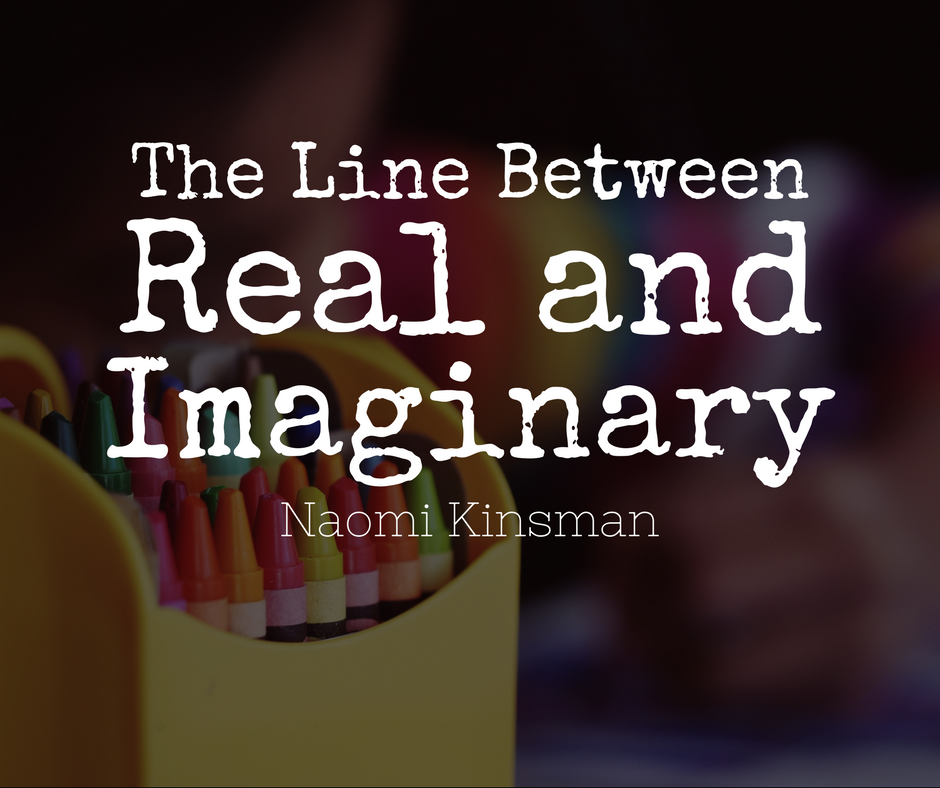
In the early days of Society of Young Inklings, our supporters gathered to discuss a mission statement. As the conversation progressed, we found ourselves in a tug-of-war: play, imagination, and creativity vs. real life.
One group argued that we ought to show how a fun, play-centered approach would prepare kids for real-life thinking and writing tasks. The other group argued that developing the ability to play, imagine and think creatively was an essential end unto itself. As I listened to compelling arguments on both sides, I felt myself slipping and sliding on the line between real life and imagination.
Where is the line between real and imaginary?
Now, lest you worry that I’ve lost my grip on reality, let me provide an example. A number of years ago, I volunteered for an organization called Each One Reach One. Actors and writers were sent to a juvenile detention center to facilitate a writing process. Inmates wrote in metaphor from the perspective of an object, an animal, and a force of nature, creating two-character scenes. We can all agree that there is no such thing as a talking tornado. However, when that tornado poured out its rage and need for revenge and destroyed an entire city in desperation, well, everyone knew we weren’t talking about a tornado at all. How do we get at the feelings inside us that matter most? Often, the only safe way to access them is through our imaginations.
I can provide examples until I’m blue in the face of how creative thinking skills are essential for the workers of today and tomorrow. And while I do care about the future success of our Inklings, those success-centered reasons aren’t the ones that I continue to devote myself to SYI year after year.
Why does creativity matter?
I’m committed to helping youth develop and express their creativity because I believe that the ability to use one’s voice, to tackle complex problems, and to transform pain and joy into words and images, is the definition of health and growth. We aren’t imagining instead of dealing with real life. We’re imagining in order to transform real life into what it has the potential to be.
What is creative voice?
The Writerly Play Attic, one of the Writerly Play rooms, gives us space where we talk about and strengthen the intersection between what we create and our own experiences and perspectives. As storytellers, we label this intersection voice. Voice is what differentiates one person’s creation from another. We might both tell a story about loyalty, but our stories will vary because no two voices are alike.
One reason the tug-of-war between real and imaginary exists is that too often, we use imagined worlds as a means of escape. The ability to use our voice is a complex skill, arguably the most complex of all the creative skills. In order to even begin, we must build a strong foundation of courage. We have to be willing to tap into our hearts and bring them to the page, whether we’re writing about dragons, or our own neighborhoods, or anything in between.
What skills help us develop our voice?
– Paying attention to the world around us
– Building strategic habits to clear mental clutter
– Learning to sort, choose and organize ideas
– Asking strong questions
– Following our curiosity
– Reflecting on what we think and feel
How does creativity lead to health and growth?
Had we told our young charges at the juvenile detention center that we planned to tackle the skills on the list above, it’s likely we would have encountered resistance. But, when we started by playing a theatre game, we dove right in. That’s the magic of the creative process. We wade into it, and at some point, the above skills are necessary to move forward. Already committed, we wade deeper. Soon, we find ourselves in a very real place, usually entirely more at the heart of things than if we had insisted on sticking to real-life writing.
We are always looking for youth who need opportunities such as this, to stretch their wings and explore their potential. Do you know a young person who is ready for the next challenge? You can learn about our mentorship here. Scholarship information can be found here.
No matter how you engage with SYI and the creative process in general, we invite you to rethink your understanding of the line between real and imaginary. We encourage you to make room for unconventional exploration and growth and to remember—just because something looks fun doesn’t mean it’s trivial. Sometimes play is the very thing that is needed.
Sign up below for our mini-course, A Week of Creativity to learn more about how we develop creativity here at Society of Young Inklings.

